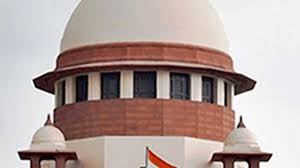Whether the delay of 6 days in intimating the Insurance Company about the theft comes within the purview of breach of Condition No. 1 and also whether on facts there was breach of condition No. 5 of the insurance policy to justify the rejection of the claim in toto? (Para 8)
When the complainant had lodged the FIR immediately after the theft of the vehicle, and when the police after the investigation had arrested the accused and also filed challan before the court concerned, and when the claim of the insured was not found to be not genuine, the Insurance Company could not have repudiated the claim merely on the ground that there was a delay in intimating the Insurance Company about the occurrence of the theft.” (Para 9)
We have carefully perused the order. In the said order, it is recorded that concurrently the Claimant lost before the fora below and it is also recorded that the State Commission did not find the ground of leaving the ignition keys in the vehicle to be a valid reason to repudiate the claim. However, on the ground of unexplained and inordinate delay in lodging the FIR, the repudiation was upheld. In that case, while the loss was on 25.03.2010, the intimation to Police was only on 02.04.2010 so clearly it was a breach of Condition No.1. No doubt, in the penultimate paragraph of the order it is recorded that the want of reasonable care on the part of the petitioner in that case operated heavily against the petitioner and it was concluded that the repudiation could not be faulted. However, the primary reason for repudiation was the violation of condition No.1 viz. the delay in intimation to the Police. Further since there was a fundamental breach of Condition No.1, there was no occasion to raise points for settlement of claim on non-standard basis. There is no whisper about the breach of Condition No.5 being not a fundamental breach. We find the present case, on facts, completely different as there is no breach of Condition No.1 because the intimation to the police was immediate. There have been concurrent awards by the District Forum and State Commission on non-standard basis by applying Nitin Khandelwal (supra) and Amalendu Sahoo (supra). Hence, the order will in no manner assist the respondent-Company. (Para 17)
The District Forum and the State Commission have rightly applied Amalendu Sahoo (supra) to the facts of the present case and awarded 75% on non-standard basis. (Para 18)
Nitin Khandelwal (supra) and Amalendu Sahoo (supra) lay down the correct formula that where there is some contributory factor, a proportionate deduction from the assured amount would be all that the Insurance Company can aspire to deduct. We are inclined to accept the plea of the appellant that in the case at hand, on the facts governing the scenario, Clause (iii) of the table set out in para 14 of Amalendu Sahoo (supra) is attracted and the District Forum and the State Commission were justified in awarding the entire 75% of the admissible claim. (Para 19)
For the aforesaid reasons, the Appeal is allowed. We set aside the judgment of the National Commission and restore that of the District Forum as affirmed by the State Commission. No order as to costs. (Para 20)
SUPREME COURT JUDGMENT
Citation: 2023 STPL(Web) 122 SC
Ashok Kumar Vs. New India Assurance Co. Ltd.
Civil Appeal No. 4758 of 2023[Arising Out of SLP (Civil) No. 25256 of 2018]-Decided on 31-7-2023
https://stpllaw.in/wp-content/uploads/2023/08/2023-STPLWeb-122-SC-2.pdf







